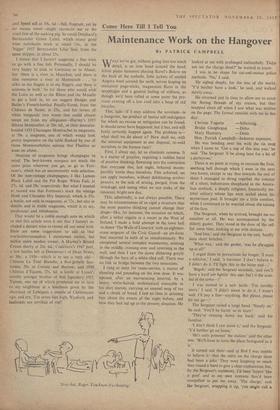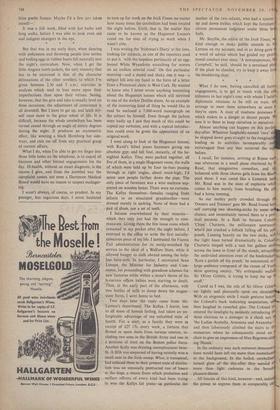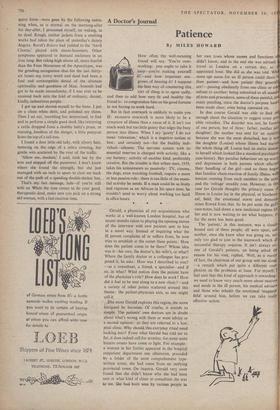Come Here Till I Tell You
Maintenance Work on the Hangover
By PATRICK CAMPBELL WHAT we've got, without going into too much detail, is an iron band around the head, felted piano hammers playing Ravel's Bolero on the back of the eyeballs, little jackets of matted Angora wool around the teeth, nerves leaping on miniature pogo-sticks, magnesium flares in the (esophagus and a general feeling of stiffness, as though we'd been rolled at some point the pre- vious evening off a low roof into a heap of old bicycles.
This, lads--if I may address the novitiate—is a hangover, the product of bestial self-indulgence for which no excuse or mitigation can be found. It should never have happened, but it has, and will fairly certainly happen again. The problem is— what shall we do about it? How shall we, with the minimal equipment at our disposal, re-weld ourselves to the human race?
First, I alway say, let us eliminate remorse. It is a matter of practice, requiring a sudden burst of positive thinking, flowering into the conviction that everyone else, last night, behaved incom- parably worse than ourselves. This achieved, we can apply ourselves, without debilitating arriere- pensees, to the task of arising, purged, from the wreckage, and seeing what we can make of the innocent, bright new day.
This, admittedly, is not always possible. There may be circumstances of so rigid a structure that the most positive thinking cannot change their shape—like, for instance, the occasion on which, after a lethal regatta at a resort in the West of Ireland, I made a bold attempt in the town hall to dance 'The Walls of Limerick' with an eighteen- stone sergeant of the Civic Guard—an art-form that occurred to both of us simultaneously. We completed several complex manoeuvres, meeting in the middle, crossing over and reversing to the wall, and then I saw the dawn slithering greyly through the bars of a white-tiled cell. There was no link or bridge between the two sensations.
I rang at once for room-service, a matter of shouting and pounding on the iron door. It was opened, after an excruciating interval, by a heavy, white-haired, ecclesiastical constable in his shirt sleeves. carrying an enamel mug of tea and a chunk of bread. I lost no time in quizzing him about the events of the night before, and how they had led up to the present, situation. He 'Stop that, Roger. You keen. it's cheating.' looked at me with prolonged melancholy. 'Didja not see the charge sheet?' he wanted to know.
I was in no shape for cat-and-mouse police methods. 'No,' I said.
He sighed deeply, for the sins of the world. 'Y'd betther have a look,' he said, and walked slowly away.
He returned just in time to allow me to catch the fleeing threads of my reason, but they snapped clean off when I saw what was written on the page. The format remains with me to this day: Chrissie Fogarty —Soliciting.
Bridie Geoghegan —Ditto.
Mary Hanratty —Ditto.
Hon. Patrick Campbell—Indecent exposure.
He was bending over me with the tin mug when I came to. 'Get a sup of this inta you,' he said. 'The Sergeant 'II be along later for a bit of a parleyvoo.'
There is no point in trying to recreate the livid, seething hell through which I went in the next two hours, except to say that towards the end of them I managed to string together the concept of a silent, industrious sheephand in the Austra- lian outback, a deeply religious, fanatically tee- total solitary whose lips were sealed about his mysterious past. It brought me a little comfort, while I continued to be worried about the raising of the fare.
The Sergeant, when he arrived, brought me no comfort at all. He was accompanied by the elderly gaoler. They stood in the door of the cell for some time, looking at me with distaste.
'And him,' said the Sergeant in the end, 'hardly outa short britches.'
'What way,' said the gaoler, 'was he dhragged up at all'?'
I urged them to prevaricate no longer. 'I want a solicitor,' I said, 'a barrister. I don't believe it. I didn't do it. I'll fight this to the bitter end—.'
'Begob,' said the Sergeant seriously, 'and you'll have a hard job fightin' this one. Isn't it the scan- dal of the town—?'
I was moved to a new tactic. 'I'm terribly sorry,' I said. '1 didn't mean to do it. I wasn't well. I'll pay a fine—anything. But please, please let me go—.'
The Sergeant raised a large hand. 'Steady on,' he said. 'You'll be havin' us in tears.'
'They're running down me back,' said his familiar.
'I don't think I can stand it,' said the Sergeant. 'Y'd betther go on home.'
'He's only poisonin' the station,' said the other one. 'We'll have to have the place fumigated as it is.'
It turned out then—and at first I was unable to believe it—that the entry on the charge sheet had been a joke. They were laughing so much they found it hard to give a clear explanation, but, by the Sergeant's testimony, I'd been 'leppin' like a goat' and in my own interests they'd been compelled to put me away. 'The charge,' said the Sergeant, wrapping it up, 'you might call a bitta poetic licence. Maybe I'd a few jars taken meself—: It was a full week, filled with hot baths and long walks, before I was able to look even old and indigent strangers in the eye.
But that was in my early days, when dancing with policemen and throwing people into nettles and boiling eggs in rubber boots fell naturally into the night's curriculum. Now, when I get the little Angora tooth-jackets, the only memory that has to be exorcised is that of the character delineations of the other revellers, to which I'm given between 2.30 and 5 a.m.; exercises in analysis which tend to lean more upon their imperfections than upon their virtues. Seeing, however, that the give and take is usually level on these occasions, the adjustment of conscience is all downhill. But I have to get up, and latch my- self once more to the great wheel of life. It is difficult, because the whole cerebellum has been turned round through an angle of ninety degrees during the night. It produces an asymmetric effect, like wearing a black Homburg hat side- ways, and cuts me off from any practical grasp of current affairs.
What I do, when I'm able to get my finger into those little holes on the telephone, is to cancel all business and other formal engagements for the day. Ill-health, without an exact diagnosis, is the reason I give, and from the jumbled way the complaint comes out even a Dartmoor Medical Board would have no reason to suspect malinger- ing.
I wasn't always, of course, so prudent. In my younger, less sagacious days, I never hesitated to turn up for work on the Irish Times, no matter how many times the cerebellum had been rotated the night before. Until, that is, the matter that came to be known as the Huguenot Lousers cured me for ever of trying to work when I wasn't able..
I was writing the 'Irishman's Diary' at the time, looking for subjects, as one of the reporters used to put it, 'with the hopeless pertinacity of an egg-. bound White Wyandotte scratching for worms on an endless arterial road.' On this particular morning—and a dazed and shaky one it was—a subject fell into my hand in the form of a letter from a Protestant cleric in West Cork. He wanted to know why I never wrote anything interesting about the Huguenot houses which still survived in one of the darker Dublin slums. As an example of the interesting kind of thing he would like to read he enclosed a 7,000-word monograph on the subject by himself. Even though the jackets were badly up I saw that much of this could be copied out verbatim, and with a topical introduc- tion could even be given the appearance of an original work.
I went along to look at the Huguenot houses, with Ravel's felted piano hammers giving me absolute gyp; and fell foul, instantly, of the be- nighted Kellys. They were packed together, all five of them, in a single Huguenot room, the walls of which were held up by four tie-bars passing through at right 'angles, about .waist-high. I'd never seen people farther down the pipe. The only piece of furniture was a wire mattress sup- ported on wooden boxes. There were no curtains. The Kellys themselves—females ranging from infants to an emaciated grandmother—were dressed mainly in sacking. None of them had a pair of shoes, nor a set of teeth.
I became overwhelmed by their miseries— which they only just had the strength to com- municate. Giving them the few loose coins which remained in my pocket after the night before, I returned to the office to write the first socially- conscious piece of my life. I lambasted the Fianna Fail administration for its mealy-mouthed lip service to the ideal of a Welfare State, while it allowed hunger to stalk abroad among the help- less have-nots. In particular, I excoriated Sean Lemass, the Minister for Industry and Com- merce, for procceding■with grandiose schemes for new factories while within a stone's throw of his luxurious offices babies were starving to death. Then, in the early part of the afternoon, with two bottles of milk to damp down the magne- sium flares, I went home to bed.
Two days later the reply came from Mr. Leniass's department. The Kellys, I learnt, lost to all sense of human feeling, had taken an un forgivable advantage of my enfeebled state of health. For a start, as a family they were in receipt of £27 15s. every week, a fortune that flowed in upon them from various sources, in- cluding two sons in the British Army and one in a position of trust on the Boston police force. Another Kelly was drawing unemployment bene- fit. A fifth was suspected of having recently won a small sum in the Irish sweep. What, it transpired, had reduced them to their present state of destitu- tion was an unusually protracted run of losers at the dogs, a mania from which probation and welfare officers of every kind had been trying to woo the Kellys for years—in, particular the mother of the two infants, who had a system up and down trebles which kept the furniture almost permanent lodgment under three br balls.
Mr. Smyllie,_the editor of the Irish Times, kind enough to make public amends to Lemass on my account, and in so doing gave a word of advice which has guided my prof sional conduct ever since. 'A newspaperman, Campbell,' he said, 'should be a sensitised plat, If the plate be clouded, try to keep it away fro the shuddering shop.'
* * * What I do now, having cancelled all forty engagements, is to get in touch with the col .tributors to last night's rout with whom I belie diplomatic relations to be still en train, at arrange to , meet them somewhere as soon they're open. A state of madness possesses which makes us a danger to decent people. 14. owe it to them to keep ourselves to ourselves.
Almost anything can happen on this perilo day-after. Whatever laughably-named 'cure' in be slopped down goes straight to the imaginati leading us to activities incomparably - m extravagant than any that occurred the ni before.
I recall; for instance, arriving at Ripon ra one afternoon in a small plane chartered by Read, that imaginative comedian, and holstered with three chorus girls from his Blac pool show. I was cured like a Limerick harts Mr. Read was in the state of euphoria whit comes to him merely from breathing. He al had a horse running.
As our motley party crowded through th 'Owners and Trainers' gate Mr. Read found hill' self carrying two shooting-sticks by some mi •i chance, and immediately turned them to 'a prat' tical purpose. In a flash he became Colone 'Chips' Charteris, . the millionaire sportsman who'd just cracked a fetlock falling off his poi poneh. Leaning heavily on the two sticks, wit the right knee turned dramatically ,in, Colone Charteris limped with a taut but gallant smil across the lawn in front of the stands, attractie the undivided attention even of the bookmakers 'Kem a purleh off the poneh,' he announced, to large audience composed of the cream of York shire sporting society. 'My orthopaedic wallah Sir Oliver Giblets, is trying to keep me up I snuff.'• Cured as I was, the role of Sir Oliver Giblet sat lightly and pleasantly upon my shoulders With an enigmatic smile I made gestures behin the Colonel's back indicating amputation, an then laughed in cannibal glee. The Colonel re entered the limelight by suddenly introducing Ill three chorines to a dowager in a check suit 3 'the Ladies Arabella, Araminta and Avanotha- and then laboriously climbed the stairs to the restaurant where he subsequently stood on '1 chair to give an impression of Max Bygraves sing' ing 'Hands.'
In the ordinary way such extrovert demonstra' tions would have left me more than mumchanc in the background. In the boiled, cerebellum' turned glow of the day-after they seemed more than light cadenzas in the broader pleasure theme. All fancies of this kind, however—and, indeed' the power to express them in comparably On' quent form—were gone by the following morn- fling when, as is normal on the morning-after the day-after, I presumed myself, on waking, to be dead. Rough, leather jackets from a smelting works had taken the place of yesterday's dainty Angora. Ravel's Bolero had yielded to the 'Anvil Chorus,' played with steam-hammers. Other symptoms appeared to demand enclosure in an iron lung. But riding high above all, more fearful than the Four Horsemen of the Apocalypse, was the grinding recognition that for the last thirty- six hours my every word and deed had been a foul and contemptible denial of the ultimate spirituality and, goodness of Man. Amends• had got to be made immediately, if I was ever to be received back into the fold of ordinary, decent, kindly, industrious people.
I got up and shaved myself to the bone. I put on a clean white shirt, and polished my shoes. Then I set out, trembling but determined, to find and to perform a simple good deed, like retrieving a rattle dropped from a chubby baby's pram, or rescuing, heedless of the danger, a little pussycat from the top of a tall tree.
I found a dear little old lady, with silvery hair, teetering on the edge of a zebra crossing, her gentle wits scattered by the roar of the traffic.
'Allow me, madam,' I said, took her by the arm and stepped off the pavement. I don't know where she found the strength, but she just managed with an inch to spare to claw me back out of the path of a speeding double-decker bus.
That's my last message, lads—if you're still with us. When the time comes to do your good, therapeutic deed, make sure you pick on a strong old woman, with a fast reaction time.








































































 Previous page
Previous page